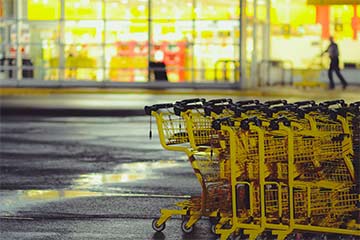
The coronavirus pandemic is bad news. It has shut down a significant portion of the world’s economy and killed far too many people. If, however, you’re willing to hunt for a silver lining, the shutdowns and social distancing could be an opportunity for some brick-and-mortar companies finally to get online.
Why No Ecommerce?
Most folks in the retail industry understand the importance of ecommerce. So, you might be asking, “How could a successful retail business have no ecommerce component?” But they exist.
In many cases, these companies are small or mid-sized, successful, and busy enough that they simply had not yet developed an ecommerce presence.
“Going online was something they had hoped to do, but it wasn’t something that they needed to do,” explained Mike Potter, the co-founder and CEO of Rewind, a cloud backup service with approximately 10,000 clients on Shopify and BigCommerce. Potter’s company has been on-boarding some new-to-ecommerce retail customers driven online by the pandemic.
“Their local business was successful,” Potter said. “They were doing fine. It wasn’t something that they had to do out of necessity — to go online. It would have been a nice-to-have.”
This scenario is not too difficult to understand. Imagine you have a retail shop or even a small chain of shops.
As the owner of a brick-and-mortar business, you probably don’t have a lot of ecommerce experience. You may have some trepidation about hiring new folks, spending money on new software, taking hundreds or thousands of product photos, and executing on an unknown number of other tasks.
In “normal” times, you therefore have little motivation to move your store’s products online. You’re busy taking care of the customers right in front of you.
Another category of shop owners and managers are comfortable with their businesses and lifestyle.
“In some cases, those merchants are not necessarily looking to grow their business in that way and add that complexity. So they’re happy just running the local store that they’ve got. They are happy selling to the local consumers they’ve got. They know their customers, and they’re satisfied with that.” Potter said.
Opportunity
The coronavirus pandemic and its associated store closures offer both a strong motivation to start selling online.
The first of these “opportunities” — if we can call anything related to the pandemic an opportunity — is a powerful and immediate reason to open an online shop.
Around the world, brick-and-mortar stores are closing to reduce the virus’s spread.
The same business owners and leaders that either did not have the time or energy for ecommerce or that were simply not interested in growth are perhaps thinking, “‘Okay, my business doesn’t work the way that it was working before. The customers that I had are no longer able to come to the store,'” Potter said.
“Even if the store is open I think there is a general apprehension across American at least, probably Europe as well, that people just don’t want to be interacting with other people at this time…they would prefer to be shopping online.”
“So I think it is more of a necessity now than it was in the past where it was maybe, ‘Yeah, that would be a nice thing. We’d like to do that someday.’ Now it’s become a survival sort of thing from the business standpoint,” Potter continued.
Moreover, some retail businesses may also have the time and people to get online now.
For example, all or most retail staff could be put to work (instead of furloughing them) adding products to a newly launched ecommerce site.
Photographing, as an example, a few hundred products and adding them to an ecommerce store is light work for an army of retail clerks with eight hours a day and a bit of focus.
Even if the first run of product images look more like Snapchat posts than professional photography, the company will have made significant strides.
“We have a saying here at Rewind,” Potter said, “We don’t want to let perfect get in the way of better.”
Click and Collect
Merchants’ newly minted ecommerce stores might not initially ship products. Rather, retailers could put their efforts into click-and-collect sales (what some call buy-online, pick-up in-store). The merchants would still be serving their local customers but in a new way.
March 30, 2020 at 04:16AM
via https//www.brucedayne.com/
Armando Roggio, Khareem Sudlow
